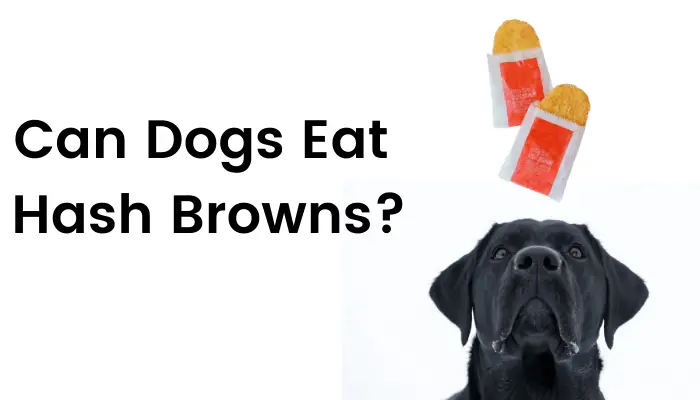Whenever I eat hash browns, I find myself wondering whether they are safe to share with my dog. As avid readers of this blog know, it’s moments like this that often inspire me to conduct research and share my findings with other dog owners around the world. So, let’s get into it; Can Dogs Eat Hash Browns?
No, dogs shouldn’t eat hash browns. Hash browns are prepared in ways and contain several ingredients that aren’t friendly to your dog’s health. From being fried in oils, absorbing dangerous fat and calorie amounts, to containing onions and salts at levels that are too high for dogs, it’s safer to just keep your pet away from them.
This could come as a surprise for many people. You could be thinking, “I give my dog potatoes, and it doesn’t affect its health.” Yeah, hash browns are made from potatoes, so let’s see how they compare to each other.
Can I Give My Dog Potatoes?
Yes, dogs can have potatoes, but only when they are cooked and properly prepared. Why cooked potatoes? Raw potatoes are toxic to dogs. The major reason for this is a compound called solanine, which is also found in tomatoes and eggplant.
Solanine is a poisonous compound that can cause damage to the health of your dog. The symptoms of solanine poisoning in dogs include stomach cramps, itchy throats due to burning, dizziness, vomiting, headache, jaundice, paralysis, heart problems, shock, inflammation of body parts, and even death.
Symptoms of solanine poisoning will vary depending on the degree of poisoning, the health, and the dog’s size.
The greenish parts of a potato, the skin of a potato, and its foliage are where solanine is found.
If your dog accidentally eats raw potatoes, book an appointment to see your vet as soon as possible.
Introduce potatoes slowly to your dog to be able to detect signs of possible allergies.
Cooked Potatoes? Yes…but…
Cooking a potato can reduce the solanine content and make it a lot safer for your dog’s consumption. You can boil and bake the potatoes. Frying is highly kicked against because of the large amounts of fat it could transfer to the potato. However, you must take care not to add any ingredients at all as most of them are toxic to your dog’s health.
Warning: the U.S. Food and Drug Administration has recently released a warning that potatoes could cause canine dilated cardiomyopathy (DCM), in other words, serious heart problems in dogs.
For this reason, it is advisable to avoid making potatoes the main meal in your dog’s diet.
Potatoes Versus Hash Browns
Potatoes boiled or baked without any seasoning are perfect for your dog. While made from potatoes, Hash browns are prepared in ways that make them inedible for your dog. This is why potatoes can be safe for dogs but not hash browns.
Hash Browns: Nutritional Information
The following are the nutritional contents of McDonald‘s hash browns per 55g serving.
Calories:160
Fat (trans fat and saturated fat): 10 g
Sodium: 360 mg
Carbohydrates: 16 g
Fiber: 2 g
Sugar: 0 g
Protein: 1 g
What Are the Ingredients for Hash Browns?
There are multiple recipes for hash browns; hence, ingredients will vary depending on the recipe. Notwithstanding, some ingredients are constant. Here is a list of what goes into making hash browns:
· Potatoes (dehydrated)
· Onion
· Flour
· Eggs
· Frying oil (vegetable oil)
· Salt
· Pepper
Are Hash Browns Toxic to Dogs?
Yes. The presence of the following ingredients in hash browns make it toxic to dogs:
Vegetable Oil: Hash browns cooked in any oils apart from olive oil and flaxseed oil will be harmful to the health of your dog. While dogs require oil for the proper moisturization of their coats and skins, some types of oil will produce harmful effects if served to your dog. Dogs usually have problems digesting vegetable oil, which can lead to various kinds of stomach discomfort.
High salt content: Salt is a necessity in the diet of humans, but for dogs, it should be avoided at all costs. This is due to the presence of sodium, the chief constituent of salt.
Sodium is very beneficial to dogs’ health, as it ensures balance in your dog’s electrolytes. However, the issue with sodium is that it is only required by dogs in very little quantities.
Your dog’s sodium needs are already supplied naturally by most of the food your dog eats. Hence, any addition of salt to your dog’s food is unnecessary.
A 55-gram serving of hash browns is already way too much salt for your dog’s system and will lead to salt poisoning. When a dog suffers from salt poisoning, its muscles become stiff. It will begin to crave and consume unusually high amounts of water.
If your dog mistakenly helps itself to your hash browns, seeing the vet immediately is the wisest thing to do. Salt poisoning in dogs can lead to seizures, dehydration, vomiting, diarrhea, lethargy, and inflammation.
High-Calorie Content: a calorie measures how much energy is contained or supplied by a serving of food. Dogs need the energy to run around, play, and live their lives. This being said, it is important to note that the number of calories consumed by dogs can be too much, leading to a range of problems.
Scientists have advised that dogs shouldn’t consume more than 25 to 30 calories per pound. So, if a dog weighs, let’s say, 50 pounds, their calorie requirement will be between 1,250 calories to at the most, 1500.
It is important to watch how many calories go into your dog’s body. Hash browns contain 160 calories per 55 grams and 290 calories per 100 grams. This high number of calories in just 100 grams is a cause for concern, as hash browns can cause your dog to go way over its calorie requirement before you know it.
For instance, an average Chihuahua requires between 315 and 330 calories a day. This is the reason why the 90/10 rule has prescribed that even treats that are safe for your dog should take up nothing more than 10% of your dog’s diet.
With their high-calorie count, Hash browns can cause your dog to join the 57% of dogs in America who are suffering from obesity. Obesity, in turn, opens the door to a host of illnesses like diabetes, arthritis, breathing problems, heart disease, and cancer.
Simply put, obesity is life-threatening and treats like hash browns can expose your dog to it.
Onion: Onion is one of the popular ingredients of hash browns. While the presence of onions adds spice and zest to our food, it presents a danger to dogs.
Every part of the onion is toxic to dogs. No matter how it is cooked, it still won’t be tolerable for a dog’s system. Some people believe that onion powder should be less harmful than onion. Still, there is no indication that this is true.
Hash browns that contain onions can lead to onion toxicity in dogs. Onion toxicity will result in several negative health conditions like fainting, lethargy, vomiting, decreased appetite, and weakness. Depending on the quantity of onions and the size of your dog, onions could be fatal.
High-fat content
Fat can be included in the food of your dog. It provides energy and helps your dog maintain temperature balance during very cold weather. The problem is when fat becomes too much.
Contrary to popular belief, dogs aren’t all that susceptible to heart disease due to the high consumption of saturated fat. However, trans fat can cause great damage to your dog’s health when it is present in high amounts.
Hash browns contain trans-fat in dangerous amounts. Your dog needs to stay away from foods that contain high amounts of fat. High-fat diets can lead to canine obesity and other associated health challenges.

Can dogs have hash browns?
No, dogs should not have hash browns as they contain ingredients that are not suitable for canine consumption. Hash browns typically contain some combination of onion, potatoes, vegetable oil, and salt. Onions are toxic to dogs and can cause anemia, and too much salt can be dangerous for their kidneys. Additionally, the fatty oils found in hash browns can cause gastrointestinal upset in dogs and potentially lead to pancreatitis. All in all, hash browns are not suitable for canine consumption and should be avoided.
It is important to be mindful of what foods you are giving your dog. While some human foods can be safe for dogs to eat, there are plenty of others that can cause serious health issues. Hash browns are just one example of a food that can be potentially dangerous for your canine companion. As a general rule of thumb, it is best to avoid feeding your dog any processed human foods and stick to a diet that is specifically designed for them. Your vet can advise you on the best diet for your pup, and can help you understand which foods are safe for them to eat.
Frequently Asked Questions on Dogs and Hash Browns
Can Dogs Eat McDonald’s Hash Browns?
No, McDonald’s hash browns aren’t safe for dogs. First of all, they are fried in oil which contains bad fat and will result in digestive complications for your dog. They also have several ingredients that are toxic to the health of dogs, like salt and preservatives.
Even though there are some safe ingredients like cornflour and black peppers, they do not negate the damage that the toxic ingredients will do to your dog’s health.
Can dogs eat hash browns from Dunkin Donuts?
No, dogs can’t eat hash browns from Dunkin Donuts. Hash browns from Dunkin Donuts are not safe for dogs because they are fried in oil that isn’t friendly to dogs.
They also contain high amounts of salt, preservatives, fat, and calories. These will lead to dangerous health conditions for your dog.
Can dogs eat frozen hash browns?
No, frozen hash browns are not good for your dog. Even though they contain lower calories than the regulars from the major food outlets, the usual toxic agents like preservatives and salt are still very much present. They will do the same damage to your dog’s health as they are known for.
Can dogs eat mashed potatoes?
Yes. Mashed potatoes are safe for dogs on the condition that they don’t have salt or any seasoning whatsoever. Potatoes have a lot of amazing benefits for dogs. They strengthen your dog’s nervous and immune systems.
Note that dogs with diabetes shouldn’t be fed potatoes, as it is known to exacerbate the situation. Potatoes are high in carbohydrates which will put fuel to fire for a diabetic dog.
Can dogs eat French fries?
No. French fries are not safe for dogs. French fries contain several ingredients that are not friendly to the health of your dog.
Firstly, French fries contain a quantity of oil that may be safe for humans but not for dogs. French fries are also cooked with an amount of salt that would be too much for the system of your dog to cope with.
Can a dog eat tater tots?
No. Dogs should not be fed tater tots. Tater tots cause the same health issues as hash browns. They are fried in oils that aren’t friendly to a dog’s health and loaded with fats and calories. They also contain large quantities of salt and contain preservatives.
These are all very obvious danger signals for your dog’s health. You should keep your dog far away from tater tots.
Can dogs eat eggs?
Yes, you can give eggs to your dogs. They are safe for them to eat and also full of nutritional benefits. Eggs are a protein powerhouse and contain essential fatty and amino acids that can make a huge difference in your dog’s health.
The array of vitamins and minerals it offers might tempt you to make eggs a major part of your dog’s diet…but don’t! Eggs should be served in moderation as an addition to your dog’s primary meal. Excessive consumption can lead to obesity.
Eggs should not be served to dogs raw. They can be boiled or scrambled and served without seasoning.
Can dogs eat biscuits?
Yes, however, they must only be fed occasionally and not as the main meal.
Many biscuits contain a lot more sugar than is safe for dogs. This is why you must be choosy over the kind of biscuits you feed your dog. To be safe, homemade biscuits with low sugar quantities will serve your dog’s health best.
If your dog is diabetic, it may have to do without biscuits that contain sugar. Also, check how much calorie content each biscuit comes with to know how little of it your dog should have.
Can dogs eat sausages?
No, dogs should not eat sausages, but if they must, let it be a little bit once in a long while. This is because sausages host some ingredients that would pose serious health challenges to your dog.
Sausages contain amounts of salt that humans can tolerate but would be problematic to your dog’s health. Salt poisoning is a serious health challenge for dogs, so you would do well to keep sausages away from them.
Apart from their salt content, sausages also contain spices and seasonings that would cause great discomfort to your dog’s stomach and lead to adverse health conditions like anemia.
Many sausages contain fats in amounts that will harm your dog’s health. Pork sausages should be avoided at all costs if your dog is to escape the dangers of excess fat, which is primarily obesity.
Can dogs eat tomatoes?
Yes, dogs can have tomatoes. However, your dogs shouldn’t be fed with tomatoes that aren’t ripe.
Unripe tomatoes contain solanine, which is a poisonous organic compound. Solanine is also present in the stem and leaves of tomato plants. So, if you have a tomato garden, keeping your dog far away from it is a very crucial safety precaution.
High solanine intake will lead to a truckload of negative health consequences, which include: dizziness, jaundice, inflammation, shock, headache, heart problems, paralysis, burning throats, and possibly death.
My dog ate hash browns, what do I do?
If your dog ate hash browns, it is important to monitor them closely for any signs of gastrointestinal upset, such as vomiting or diarrhea. If your dog experiences any of these symptoms, contact your veterinarian immediately. It is also important to make sure that your dog does not consume any more hash browns, as they may contain unhealthy ingredients such as salt, oil, and a lot of fat.
Conclusion
Many dog owners, including myself, would love for our dogs to enjoy hash browns with us, but the health of our dogs must come first. The dangers of hash browns are too many to be ignored if you care about your dog’s health.
Not only are hash browns cooked in ways that are not friendly to dogs’ health, but they also contain several ingredients that fall into the same category. These ingredients are also in very high quantities.
One of the closest things to hash browns you can give to your dog is potatoes. Boiled or baked potatoes without salt and other seasonings. Do not feed your dog with raw potatoes.
Do remember that there is a chance that your dog may be allergic to potatoes, so introduce it slowly and watch out for possible allergic reactions.
For hash browns, they should be kept very far away from your dog. Dogs don’t know what’s good for them, so feel free to ignore their longing eyes without feeling bad.
Can Dogs Eat Doritos? Please read This Before It’s Too Late!



